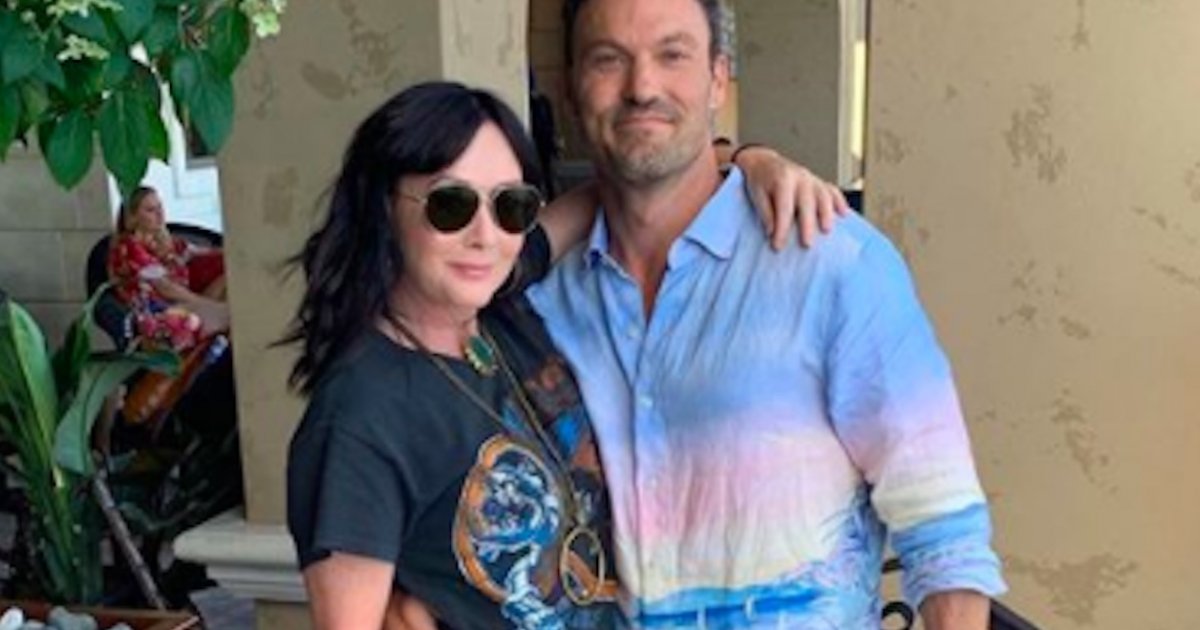When Shannen Doherty finally shared her stage 4 breast cancer diagnosis with GMA’s Amy Robach in February, she’d been keeping the news under wraps for a year.
Read More“I've said that before and I'll say it again; it's people like us that actually need the work the most,” Doherty noted. “Because it fuels us. And just because you have cancer doesn't mean that you're done.”
Fans were overjoyed to see the “90210” and “Charmed” actress on screen again: “Yooooo Shannen you were incredible,” sweetlikez commented on her Instagram. “You are my hero and idol! I can’t describe how much I love you😘” said shando army. And cancer survivor, jessicaeliades added, “Wow you bring so much hope and strength to a lot of people 💙ðŸ™..”
A Confidante At Work: Brian Austin Green
While filming the reboot of 90210, Doherty said, “I had moments of great anxiety where I thought, ‘I can’t really do this,'” Doherty said. “Green was the only person she told: “Brian was the one person who — of that group of people that knew — that I told, like, pretty quickly and said, ‘Here, the — this is what I’m dealing with.'”
“So prior to shooting, he would always call me and say, ‘Listen, you know, whatever happens, I have your back.’ He would look at me and be like, ‘We got this, kiddo’… so Brian helped me through a lot.”
Doherty shared a touching tribute to Green (above), on his July 15 birthday: “Brian, we have known each other since we were kids,” Doherty wrote. “I had the privilege of not only working with you as an actor but also directing you. But most importantly, I have had the privilege of your friendship. You are a rarity. Talented, nice, intelligent, soulful, deep, funny… the list goes on. Thank you for being in my life.”
Shannen Doherty's Breast Cancer Journey
Doherty was first diagnosed with breast cancer in 2015. Early efforts to treat her cancer without a mastectomy or aggressive treatments were not enough as doctors realized her cancer had spread to the lymph nodes. In the end, the actress underwent estrogen therapy treatments, a mastectomy, chemotherapy, radiation, and surgery before declaring herself cancer-free in 2018.
At the time, she acknowledged that the treatment had caused her to enter menopause, making pregnancy impossible without taking hormone pills. She decided against it due to fear that estrogen levels can increase the chance of cancer returning.
Dr. Heather McArthur, Medical Director of Breast Oncology at Cedars-Sinai Medical Center, says PARP inhibitor drugs can be more effective than chemotherapy in fighting metastatic breast cancer.
In her Feb. 4 interview with ABC's Amy Robach, herself a breast cancer survivor, Doherty added, "I definitely have days where I say, 'Why me?' And then I go, 'Well, why not me? Who else? Who else besides me deserves this?’" Doherty said. "None of us do."
But at Thursday’s event, she summed up cancer survivorship with one word: “I'm going to go with ‘grateful’. There are so many things to be grateful for from the start to the finish.”
Dealing With a Late-Stage Breast Cancer Diagnosis
Stage 4 breast cancer means that your cancer has metastasized and is no longer regionalized to the breast. While treatable, this cancer currently has no cure.
Kelly Shanahan, a doctor living with metastatic breast cancer, explains why she doesn’t live by the statistics.
While we don't know the specifics of Doherty's breast cancer, the treatment for metastatic disease can vary significantly depending on features of an individual woman's cancer.
Treatment options include hormone therapy, chemotherapy and targeted drugs. Sometimes surgery and/or radiation is considered. The goal is to keep you as stable as possible, slow the tumor growth and improve quality of life.
What's Next for Breast Cancer and Immunotherapy?
Immunotherapy has been a game-changing treatment option when it comes to treating several cancers. But until recently, researchers hadn't had much success using the therapy to fight breast cancer. That's changing now.
Dr. Sylvia Adams, a medical oncologist at NYU Perlmutter Cancer Center, on the use of immunotherapy in treating breast cancer.
"The question now becomes, is it only triple negative breast cancer that can benefit from immunotherapy, or are there other subtypes as well?" Dr. Sylvia Adams, a medical oncologist at NYU Perlmutter Cancer Center, said to SurvivorNet in a previous interview.
"If a tumor has the PD-L1 protein in it, that means there's already an inflammatory response, that the patient's immune system already recognized the tumor and was starting to work against it. The benefit of identifying such a strong biomarker in the triple negative subset will allow us to actually test for the presence and responsiveness to immunotherapy in other subtypes of breast cancer."
Learn more about SurvivorNet's rigorous medical review process.


